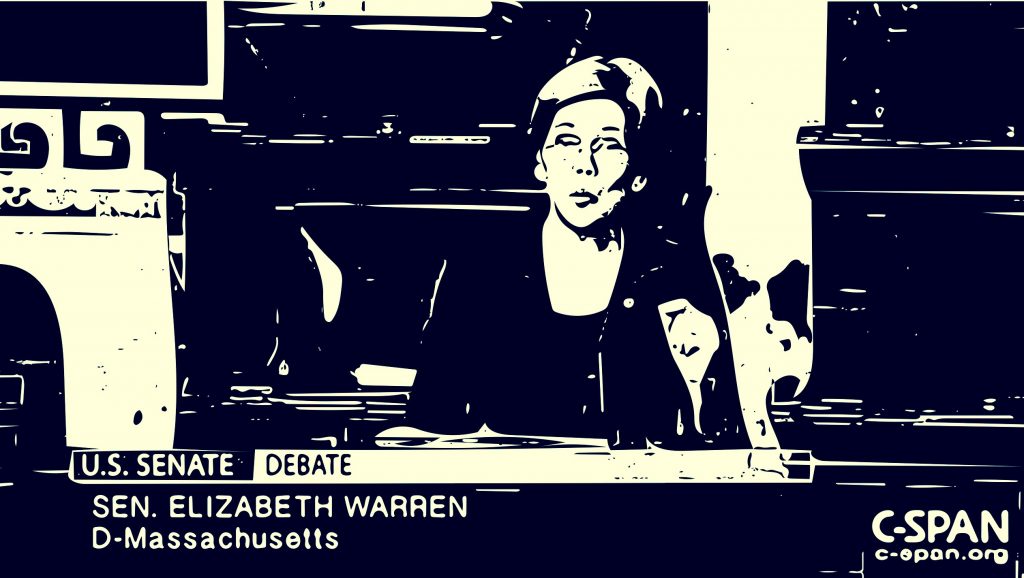
Paul Jacob
Senator Elizabeth Warren knows that when people trade, both sides gain. She made that clear last year, in a fascinating interview in The Atlantic.
But do any of the other Democrats running for president know that?
The idea of mutual benefits through trade is bedrock to understanding capitalism. Yet, socialism is all the rage among today’s Democrats. And socialists are opposed to capitalism, and prone to denying this bedrock truth.
Is this tragic or comic?
The beer-drinking, faux-Cherokee senator is comic, I know: but what about the socialists?
There is nothing more tragic than full-blown socialism: mind-control and the snitch society; purges and mass starvation, with millions upon millions dead. But give them credit: the trendy new Democrats say they’re only for the Nordic Model of . . . well, the European term for it is social democracy. The fact that they now insist on calling social democracy “socialism” might be comic. It’s sort of witless. . . .
But they sure seem to push for evermore government — more regulation, especially. And since Denmark, Sweden, and Finland are all very close to the United States on Cato Institute’s economic freedoms tallies in the institute’s annual Human Freedom Index, demanding more regulation isn’t likely to make America more like Scandinavia.
But it would be more socialistic. Emphasis on the “ic.”
Worse yet, today’s “socialists” too often defend actual Communist countries — as Bernie Sanders (BS) has done.
This suggests an unfunny ending to their mad rush to power.
And real state socialism.
So the proud proclamations of the s-label from BS and Alexandria Ocasio-Cortez (AOC) should concern us. As should the eagerness with which the majority of Democratic presidential candidates have signed onto AOC’s over-the-top proposed takeover of the economy in her “Green New Deal.”
And yet . . . these politicians are absurd, on the face of it as well as when we drill down.
It’s hard not to regard absurdity as comic.
The b.s. doesn’t end with BS.
I know, I know: our current president is a comic figure, too. And the pathetic nature of most GOP movers and shakers on Capitol Hill make them worthy of satire.
But it is also the case that Trump is funny in a way no one else is: he is playing a role and making many chortle. On purpose.
Too bad we couldn’t move him from the Presidency to a new Constitutional role, like Troll-in-Chief. There he could ensure, through mockery alone, what he promised in his State of the Union Address: America will never become a socialist country.
But is there hope in Elizabeth Warren, who taught the bedrock notion of mutual benefit through trade while a Native American Professor?
Well, in that Atlantic interview, she starts out right. But then she quickly shifts gears, saying that she could fix markets by creating a “level playing field.”
Markets create value, but Mrs. Warren asserts that “when the markets are not level playing fields, all that wealth is scraped in one direction.”
We should ask how. People are still trading, even in bumpy playing fields. How does “all that wealth” get “scraped in one direction”?
Sen. Warren looks in the right direction: the intertemporal angle. Time. The crisis of 2008, when many people discovered that they had entered into unsustainable mortgages. This makes sense since it is over time that bad investments come to light. It’s called the trade cycle, “the business cycle,” and it has been studied by economists for years. And we all get caught up in it, especially when the biggest investments most of us make — our homes — go spectacularly bust, as they did in the last downturn.
Unfortunately, Warren is a politician, not an economist. She talks not really to explain but to toot her own horn. She boasts how the shiny new regulatory program that she was involved with — the Consumer Financial Protection Bureau — leveled that playing field. The “first thing we did there at the bureau was to put new rules in place about mortgages,” she explains. “Not so that you could control the mortgage market, but so that the market would work.”
It all sounds plausible. When she talks about “information,” for example.
But something is wrong here. Note what she misses, the bumps in the mortgage industry that existed before the 2008 crash.
- The moral hazard of Fannie Mae and Freddie Mac.
- The previous congressional “fix” that pushed banks to accept poor people as good loan risks when they were not (in the name of racial justice, of course).
- The regulatory rule that created ratings agencies sans competitive market incentives.
- The Federal Reserve policies that fed the whole housing bubble mania.
Warren’s smart regulatory scheme didn’t fix these problems. It just added another burdensome layer of government.
Politicians sure love to pile on.
Now, half a year later, the senator offers a new scheme, a child-care program that Reihan Salam, last week, again in The Atlantic, says “risks increasing the federal deficit, driving up the cost of child care, and squeezing stay-at-home parents.”
And Mr. Salam notes “that last risk is one Warren should understand particularly well, since she had made her reputation as a public intellectual by warning against it.”
Warren’s no socialist — she wants to “save capitalism,” after all.
Yet by only adding to government kludge, she might as well be one.
And that’s both the comedy and the tragedy of the Democratic Party: even when Democrats forswear the s-word, they keep touting more and more government, ignoring the mistakes of their past.
March 3, 2019, Townhall.com
